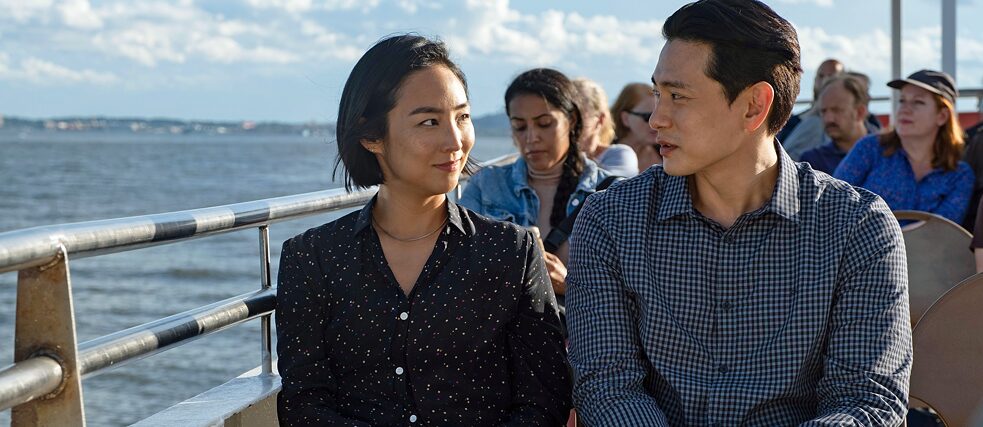Hollywood stars will be there, the competition includes 19 films from 19 countries, and Kristen Stewart is president of the International Jury – what more do you need to pique your interest in the Berlinale?
The return to normality is probably the nicest new beginning the Berlinale has been able to celebrate since the festival’s inception. Who doesn’t remember – in 2021, around a year after the covid pandemic broke out, a piecemeal festival was held – first as a digital industry gathering and then as a public summer event. A year later, and although the film fans were back in the movie theatre at the usual event time in February, they had to wear masks and sit in a chequerboard seating arrangement. After two exceptional years the Berlinale was finally allowed to resume normal service, the audience was allowed to experience cinema unaffected by the complicated covid hygiene measures.Doing justice to the realities
The festival curators had 7,431 entries to look at, whereas in 2022 it was 6,755. However, with 283 films from 67 countries, the programme selection has been pared back considerably compared with the pre-pandemic years. That can only be a good thing for the Berlinale, which had long been the butt of criticism for being too complex and oversized.Since the start of their double leadership in 2019, Mariette Rissenbeek and Carlo Chatrian have opened up the Berlinale to innovative aesthetic forms and altered viewing habits: the new competitive section Encounters features 16 films this year, among them In Water by seasoned South Korean film director Hong Sang-soo. Furthermore the Berlinale Series Award – an important prize that recognises the growing significance of the series format – will be conferred for the first time.
Diversity in the selection
19 productions from 19 countries are battling it out in the International Jury contest to win the Golden and Silver Bears, of which 15 are world premieres. “At this year’s selection we had the impression that reality’s back,” said artistic director Carlo Chatrian when the programme was announced. Eminent French documentary filmmaker Nicolas Philibert was represented for the first time in the main category. Sur l’Adamant (On the Adamant) portrays daily life in a daycare centre for adults with mental health conditions. Canadian feature film BlackBerry by Matt Johnson on the other hand takes an entertaining look at the way people communicated in the 1990s. It will also be interesting to see two Australian movies that focus on the fate of Aboriginal people in very different ways: The Survival of Kindness by Rolf de Heer in the form of a parable, Limbo by Ivan Sen as a crime mystery.Cross-genre, family stories, genre films, melodramas – this year’s main programme hints at a promising variety, in terms of both form and content.
 “Suzume” by Makoto Shinkai, Berlinale 2023, International Competition | Photo (detail): © 2022 “Suzume” Film Partners
“Suzume” by Makoto Shinkai, Berlinale 2023, International Competition | Photo (detail): © 2022 “Suzume” Film Partners
Strong presence of home-produced films
German cinema can boast five entries, an exceptionally high proportion. A renowned and militant female director is back in the Berlinale competition after 40 years: Margarethe von Trotta, famous for Heller Wahn (Sheer Madness; 1983). Her current work, Ingeborg Bachmann – Reise in die Wüste (Ingeborg Bachmann – Journey into the Desert), is a reflection on the Austrian author’s relationship with Max Frisch. Timocin Ziegler, Thea Ehre in “Till the End of the Night” by Christoph Hochhäusler | Photo (detail): © Heimatfilm, Berlinale 2023, International Competition
Timocin Ziegler, Thea Ehre in “Till the End of the Night” by Christoph Hochhäusler | Photo (detail): © Heimatfilm, Berlinale 2023, International Competition
Clear the stage for film debuts
As Carlo Chatrian explains, they want to show “young perspectives” and “a competition with films that take risks”, and for this reason three debuts have been included in the main category. In 20,000 Species of Bees, the young Basque director Estibaliz Urresola Solaguren explores a mother-child relationship. Greta Lee, Teo Yoo in “Past Lives” by Celine Song | Photo (detail): © Jon Pack, Berlinale 2023, International Competition
Greta Lee, Teo Yoo in “Past Lives” by Celine Song | Photo (detail): © Jon Pack, Berlinale 2023, International Competition
Challenges in times of crisis
The Berlinale places particular emphasis on the situation in the major war and crisis zones, particularly Ukraine and Iran. State-affiliated media and filmmakers did not receive invitations to the festival. In these difficult times the festival wants to show solidarity, but also to “open up discourse” – for instance by means of films like Superpower, which Hollywood star Sean Penn made in cooperation with Aaron Kaufman about Ukrainian president Volodymyr Zelenskyy.Stars on the red carpet
Other than Sean Penn, a considerable number of international celebrities are expected: Anne Hathaway and Robert Dinklage have confirmed their attendance, they can be seen in the opening film She Came to Me by Rebecca Miller. Kristen Stewart will head the International Jury, while director and Oscar winner Steven Spielberg will be receiving an award for his life’s work. Other big names expected at the festival include Cate Blanchett, John Malkovich, musicians from Irish rock band U2 with singer Bono. Former tennis star Boris Becker is also likely to come to Berlin.Yet another reason to look forward to the new old Berlinale. Because quite frankly – what would a festival be without its celebrities?
February 2023
